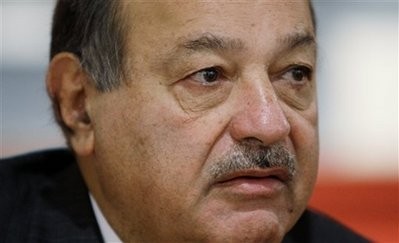Mexican telecom tycoon Carlos Slim is the world's richest person, jumping past Americans Bill Gates and Warren Buffett to become the first person from a developing nation to top the list, according to Forbes magazine.
The rise of Slim, the son of an immigrant shopkeeper who amassed a $53.5 billion fortune and bought a major stake in the New York Times, is part of an increased presence on the list of billionaires from emerging countries, said Forbes' reporter Keren Blankfeld.
Slim's worth surged in the past year as his cell phone holdings rebounded in value. He is the first non-American to top the list since 1994.

Arturo Elias Ayub, an executive at Slim's Telmex telephone company and the billionaire's son-in-law, expressed satisfaction that a Mexican businessman is now at the top of the list.
"The reaction is one of satisfaction, that this confidence in Mexico exists, and this confidence in our group's companies," said Elias Ayub, who frequently acts as Slim's spokesman.
But he said the 70-year-old magnate is not breaking out the champagne.
"This is a number brought out by a magazine that doesn't concern us, or worry us," said Elias Ayub, echoing Slim's 2007 comment about the top spot that had eluded him for years: a Spanish phrase — "me es impermeable" — that roughly translates as "I'm impervious to that."
Slim is known for wearing inexpensive suits and rarely using the computers his companies sell, preferring old-style paper notebooks. A baseball fan, his indulgences are largely limited to cigars and diet soft drinks.
While he owns — either personally or through his foundations and museums — an impressive collection of art, including works by French sculptor Auguste Rodin, he works out of a set of somewhat dowdy, 1970s-style offices.
A civil engineer by training, he has bought up troubled or government-owned companies of all types, fixed them up and resold them for huge profits.
That kind of thrifty eye for undervalued businesses has served him well, especially after the market downturns in recent years.
"In periods of crisis, he has always invested, and now we are beginning to see the fruits of that," Elias Ayub said.
Blankfeld said the 2010 top-10 list — which includes Slim, two billionaires from India and one from Brazil — reflects the increasing presence of developing nations, adding that Slim is the first person from one to top the list.
"They're kind of spread. It's a nice spread," she said of the list, long dominated by Americans and Europeans.
Gates' and Buffett's donations also played a role in their decline to the number 2 and 3 spots.
"A big reason for that is they are both very philanthropic," said Blankfeld. "They've given away so many billions of dollars."
Slim has donated to several causes, but not on nearly the same level. In January, he announced a $65 million donation for genetic research on cancer, type 2 diabetes and kidney disease in Mexican and Latin American populations.
Speaking to reporters in 2005, Slim described his philosophy.
"Wealth must be seen a responsibility, not as a privilege. The responsibility is to create more wealth. It's like having an orchard; you have to give away the fruit, but not the trees."
While Mexico belongs to the Organization for Economic Cooperation and Development, whose 30 members constitute the world's most important market economies, it is also a developing nation. More than 50 million of Mexico's 107 million people live in poverty, defined as not having enough money to meet housing, transport, education and other normal expenses. Extreme poverty — defined as not having money to buy enough food — afflicted 19.5 million people here in 2008.
In that landscape, Slim's $53.5 billion fortune has drawn frequent criticism.
"This is shameful," said Mexico City resident Ernesto Villanueva, 45. "This is part of what is wrong with the Mexican political system and the corruption in the circles of power, that allow there to be a few rich people and millions of poor."
Slim's conglomerate of retail, telecom, manufacturing and construction companies so dominate the Mexican commercial landscape it is often easy for Mexicans to find themselves talking over a Slim-operated cell phone at a Slim-owned shopping center waiting to pay a bill to a Slim-owned company at a Slim-owned bank. If the line is too long, they can catch a quick coffee at a Slim-owned restaurant.
Slim's Telmex company controls 83 percent of land phone lines in Mexico, and is also the leading Internet service provider. Another of his firms is the leading cell phone operator, and he wants to get into convergence services to offer television and interactive media.
While he has acknowledged that prices for Internet service in Mexico remain high, he has hotly denied operating a near-monopoly in calling services, or charging excessive prices for calls.
He also owns the Sears and Saks retail stores operating in Mexico. And last year,, he announced a $250 million investment in The New York Times.
After living for almost two decades in the shadow of Slim, some Mexicans say his wealth as an understandable — and perhaps inevitable — outgrowth of Mexico's lopsided, dog-eat-dog economic system.
"He was intelligent enough to get to where he is, while we, as a people, have never known how to unite ourselves," said 17-year-old Mexico City student Manuel Santibanez. "We are always looking out for ourselves."
























